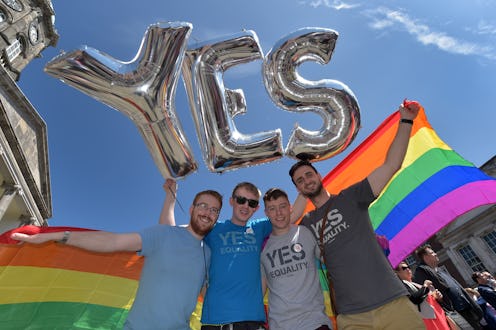News
With Same-Sex Marriage Legal, What's Next?
Wake up and smell that sweet, fresh air, America. Thanks to the Supreme Court's landmark ruling in favor of same-sex marriage rights, the United States of America is now the land of marriage equality. That's right: in all 50 states, gay and lesbian couples who love each other can get married. As can people that don't really love each other! Everyone being allowed to make the same mistakes is part of equality too, after all. So, with same-sex marriage in the books, what's the next gay rights frontier?
There are obviously a lot of different directions you can go, and it's important to realize that it needn't just be about gay rights. It's a commonly understood issue in LGBT activist circles that the struggle for gay rights has often superceded the struggle for transgender rights, and that's a problem — as tough as it is to be gay in America, the amount of violence, stigmatization and attendant rates of suicide faced by the transgender community is truly horrifying. But luckily, in this case, what ought to be the next, big push for gay rights dovetails neatly with a crucial advancement for transgender rights.
Namely: it's time for Congress to pass the Employee Non-Discrimination Act (ENDA), and for the President to sign it into law.
If you haven't heard of ENDA before, you should know that it's been kicking around for a long time. A broader, proto-ENDA known as the Equality Act was drafted all the way back in 1974, as detailed by the Center for American Progress, which sought to guarantee protection from discrimination for gay and lesbian citizens in a variety of settings — in employment, the workplace, while patronizing businesses, the whole deal. It never got out of committee in the House, and obviously, it was never passed.
Through the years, the focus has narrowed considerably. Now, ENDA is geared explicitly towards protecting LGBT Americans from discrimination in hiring and in the workplace, which would be a solid start. As detailed by the Washington Post, it was first introduced in 1994 by Massachusetts Senator Ted Kennedy and House Representative Gerry Studds. It failed both in the House and Senate, and would continue to do so for the next several years.
It wasn't until 2007 that ENDA's language was tweaked in a very consequential way. Beyond just protecting people just from discrimination on the basis of sexual orientation, gender identity was added to the mix, a absolutely essential addition — transgender workers, after all, are very vulnerable to discrimination and prejudice, to say nothing of getting hired in the first place.
The bill finally cleared it's first, major hurdle in 2013, passing the Senate by a vote of 64-32. But sadly (and predictably), it's languished in the House of Representatives ever since, despite repeated calls by President Obama for the Republican majority to pass it. Were it passed, it would become law in short order — Obama would assuredly sign it to great fanfare — but that's no guarantee going forward, seeing as we could have a Republican president after 2016.
In short, the passage and signing of ENDA would be a huge victory for gay rights, and transgender rights, and if you're looking for the next frontier of political activism, it could very well be thing.
Image: Getty Images
